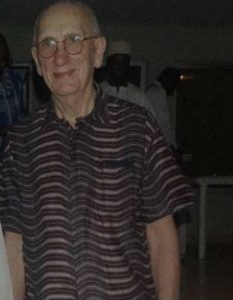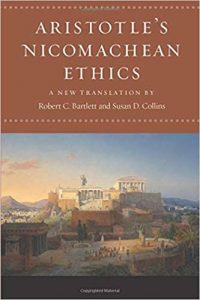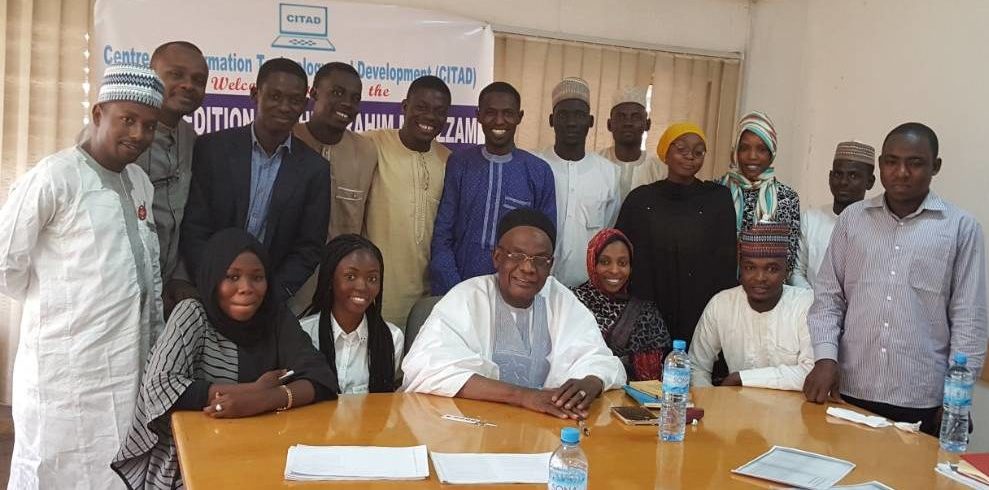By Ibrahim Lawal Ahmed
One was privileged to be among the participants of the 2019 edition of Ibrahim Mu’azzam Institute of Philosophy and Political Theory for Young People which is the third edition of the annual program organized by Centre for Information Technology and Development (CITAD), Kano. It was held at Bayero University, Kano from 11th to 14th November. The institute emerged as a proactive response to the decline of philosophy and critical thinking in the Nigerian society, particularly among the youths. Universities are continuously producing graduates who are, at best, narrowly confined to their area of specialization, and at worst, certified illiterates. The fact that people are more concerned with discussing trivial issues such as the president getting a second wife, BBNaija rather than developmental issues that will move the nation forward, the poor creativity in literature, the attitude of sharing information without checking and verification, and adoption of superficial lifestyles all express the crisis of thinking in the country.

The late Prof Bjorn Beckman
No society can progress with these attitudes. Politically speaking, democracy can only thrive where the citizens can interrogate government policies, programs and political office holders regarding their promises and responsibilities, thereby holding them accountable. The ability to raise the right questions by the citizens is a fundamental requirement for socio-political and economic development.
Having been my undergraduate thesis supervisor, I needed not to be introduced to Mu’azzam. The name itself speaks to the critical mind. Mu’azzam is such a wise teacher, to use the words of Khalil Gibran, “who does not bid you to enter the house of wisdom but rather leads to the threshold of your mind.” He makes his students to go beyond the common sense by questioning the ‘common’ in the ‘sense.’ In other words, what is the common in sense that is regarded as common sense? Confusion is a sign of learning.
Due to public holiday declared on November 11th, 2019, the program started on November 12th with a celebration of the life of Bjorn Beckman. Beckman is another icon who recently passed away on November 2nd, 2019. The interesting thing is, Beckman was a mentor of Mu’azzam at Ahmadu Bello University, Zaria. Not only Mu’azzam, he was one with our other great scholars like Mu’azu M. Yusif (aka M.M. Yusif), Ya’u Y.Z. Professor Attahiru Jega.
Day 1 of the program commenced with eulogies by Y.Z. Ya’u; M.M. Yusif and Professor Haruna Wakili, all mentees of Beckman. His books such as The Wheat Trap, Union Power In The Nigerian Textile Industry: Labour Regimes and Adjustment among several others were displayed for us to go through. While eulogizing him, M.M. Yusif of the Department of Political Science, Bayero University, Kano recalls how passionate Beckman was on issues of labour that he was very supportive when they tried to initiate the establishment of Department of Labour Studies in BUK. He was able to inspire research on labour issues making labour studies to be a key domain in Political Science in Nigeria. One point about Beckman’s writings, as pointed by Dr. Aminu Hayatu, is it teaches activism. Therefore, civil society organisations will do well to look on to his writings for inspiration. Mu’azzam brought to our knowledge that the best papers of Beckman such as “Who is Afraid of Marxism? were never published. As Marxism is resurrecting, it will be timely for such papers to be published now, he said.
Since we can all think, what make a thinking critical? For three days, Mu’azzam leads us to that threshold of our mind where we contemplate about our existence, our life, the beliefs we hold, the things around us, the world we live, from the gestures we make to the words we speak, from our imaginations to our inventions. Trivia and conformity were questioned, curiosity was instituted and philosophy was introduced.
‘Who am I?’ is a question one should always ask him or herself. As Socrates advised, “know thyself.” Why? Lao Tzu answered, because knowing yourself is true wisdom. The thing is, the question ‘who am I?’ will generate other questions like, ‘why am I the way I am? Why are they the way they are? Why am I poor and that person is rich? What is life? What is death?….’ These questions will bring an urge to find answers; to find the truth, thus philosophy is all about search for the truth. Truth is difficult to find. Truth is a qualification of true we give to a thing or situation which may not necessarily be so. Yet, there is objective truth, therefore, truth is truth. There is nothing like partial-truth or subjective truth. What we call subjective truths are differences of will and opinions, hence, there is difference between opinion/will and truth. Truth, is a technical question while opinion is concerned with right and wrong and, therefore, a moral question.
 Interestingly, the theme of our discussion was ‘post-truth;’ the era we live in, a phenomenon we are experiencing. We are in an era where fallacy takes the appearance of truth. In other words, false is now so diluted with the truth that it is difficult to discern. As Mu’azzam argues, “lie presumes the existence of reality.” This can be seen in the issue of Fake News and hate speeches which are facilitated by the social media. The worrying things is, the acceptance of these widespread falsehood by the people. Thus ‘disinformation and misinformation’ become the defining character of Post-Truth. Objectivity and facts appear meaningless. Post-Truth politics becomes centred on appeal to opinion and emotions. Therefore, it becomes all about strategic deception, false (fabricated) knowledge, competing false claims all in view of manufacturing consent and mobilizing support by politicians. The consequences is, it undermines society. It dampens the bond as everyone lays superiority to his own opinion and universal truth ceased to exist. It causes us to doubt the truth which we know and neglect institutions and practices which have been vital to our progress. As such, countering the forces of Post-Truth is of utmost importance.
Interestingly, the theme of our discussion was ‘post-truth;’ the era we live in, a phenomenon we are experiencing. We are in an era where fallacy takes the appearance of truth. In other words, false is now so diluted with the truth that it is difficult to discern. As Mu’azzam argues, “lie presumes the existence of reality.” This can be seen in the issue of Fake News and hate speeches which are facilitated by the social media. The worrying things is, the acceptance of these widespread falsehood by the people. Thus ‘disinformation and misinformation’ become the defining character of Post-Truth. Objectivity and facts appear meaningless. Post-Truth politics becomes centred on appeal to opinion and emotions. Therefore, it becomes all about strategic deception, false (fabricated) knowledge, competing false claims all in view of manufacturing consent and mobilizing support by politicians. The consequences is, it undermines society. It dampens the bond as everyone lays superiority to his own opinion and universal truth ceased to exist. It causes us to doubt the truth which we know and neglect institutions and practices which have been vital to our progress. As such, countering the forces of Post-Truth is of utmost importance.
To be educated, as Achebe argued, is to develop a questioning mind. We must question the information we receive in our gadgets from others even if they are authority. Critical thinking demands us to do such. Critical thinking is not about criticizing, but rather interpreting of information, that is verifying the information and taking a deep search to the key issues of the information thereby having below the surface understanding. It is such that if one were asked to give that information back, one can give it in his or her own words. Debunking will, therefore serve as a good means of checking fake news and narrations (counter-narrations). This task lies on us, the young people. It is not an easy task, but it has to be done because it is our future that is at stake. Therefore, we must adopt a reading culture; not reading everything, but reading what is worth reading. To know what is worth reading, attend the next edition of Ibrahim Mu’azzam’s Institute of Philosophy and Political Theory.
But before then, it might do well to spend this week engaging your mind with some philosophical stuff and brain teaser as the World Philosophy Day is coming up on November 21st. You may watch a 1979 movie Being There, read Nicomachean Ethics by Aristotle and The Prophet by Khalil Gibran, play chess, or engage in solving puzzles. The goal is to sharpen the mind.
It is worth appreciating CITAD for initiating and sponsoring the program every year without any sponsorship, ensuring the whole environment is conducive for learning, including providing us with their publications, good breakfast and lunch. Then to Mallam Mu’azzam who was able to stay with us throughout the three days from morning to evening, tolerating a lot of our mediocrity. Laureates believe that the only way they can repay this service is to be the agent of the change desired in Nigeria by not only developing the knowledge acquired but passing it on. This, they assured, they would do.




























